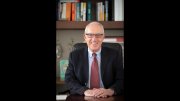Isaac Kohlberg, who came to Harvard in May 2005 to forge partnerships with for-profit companies, launch startups, and license intellectual property based on research developed in Harvard labs, announced on Thursday that he will retire at the end of the calendar year.
Under Kohlberg’s leadership, the University’s Office of Technology Development (OTD) grew to include more than 50 full-time staff with expertise in business development, corporate alliances, and intellectual property law. In the past five years alone, according to the announcement, “the advancement of Harvard research has resulted in the launch of 96 startups raising nearly $2.8 billion, more than 2,000 reports of innovations, 897 U.S. patents held by Harvard, and $300 million in research funding through industry partnerships.” OTD helps Harvard researchers translate their discoveries into technologies that can benefit society. (For an account of how OTD operates, see “Accelerating Innovation.”)
Harvard’s corporate partnerships are likely to become increasingly important as federal funding for research is frozen, and overhead costs for any future work for the government are reimbursed at rates that the University might find unacceptable.
An M.B.A. with prior experience managing technology commercialization at institutions in the United States and Israel, Kohlberg was instrumental in professionalizing technology transfer at the University. Prior to his arrival, Wallace professor of applied physics Federico Capasso told this magazine in 2019, “In order to file a patent, you needed to know who to talk to. It was like pulling teeth.” (For an account of that period and the positive effect of Kohlberg’s arrival, see “Retooling Tech Transfer.”)
By 2019, and for the five preceding years, Harvard was ranked third, behind only Stanford and MIT, on Reuters’s list of the world’s most innovative universities, a metric that tracks inventions and citations. (Reuters has not published the ranking since 2019.)
Under Kohlberg’s leadership, OTD launched three accelerators that help commercialize discoveries: the Blavatnik Biomedical Accelerator, the Grid Accelerator in the School of Engineering and Applied Sciences, and the Climate and Sustainability Translational Fund. During his 20-year tenure, industry-sponsored research more than doubled.
“Investments in science help advance knowledge, fuel progress, and spur economic development,” said Provost John Manning in a statement. “That sense of mission runs through Harvard’s innovation enterprise, and we are grateful for the leadership role Isaac played in supporting a thriving culture of discovery and innovation.”
“As I begin the next chapter of my life, I am deeply proud of all we have accomplished together,” said Kohlberg in the announcement. “Harvard’s community has shown what’s possible when great ideas are met with entrepreneurial spirit, smart funding, and a commitment to the public good. The next wave of discovery and impact is just beginning.”
Kohlberg will remain an advisor to the University after his retirement.









